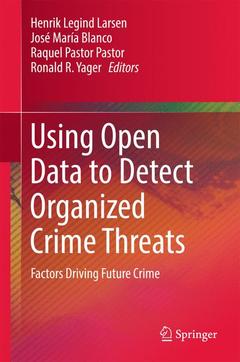Using Open Data to Detect Organized Crime Threats, Softcover reprint of the original 1st ed. 2017 Factors Driving Future Crime
Coordonnateurs : Larsen Henrik Legind, Blanco José María, Pastor Pastor Raquel, Yager Ronald R.

This work provides an innovative look at the use of open data for extracting information to detect and prevent crime, and also explores the link between terrorism and organized crime. In counter-terrorism and other forms of crime prevention, foresight about potential threats is vitally important and this information is increasingly available via electronic data sources such as social media communications. However, the amount and quality of these sources is varied, and researchers and law enforcement need guidance about when and how to extract useful information from them.
The emergence of these crime threats, such as communication between organized crime networks and radicalization towards terrorism, is driven by a combination of political, economic, social, technological, legal and environmental factors. The contributions to this volume represent a major step by researchers to systematically collect, filter, interpret, and use the information available. For the purposes of this book, the only data sources used are publicly available sources which can be accessed legally and ethically.This work will be of interest to researchers in criminology and criminal justice, particularly in police science, organized crime, counter-terrorism and crime science. It will also be of interest to those in related fields such as applications of computer science and data mining, public policy, and business intelligence.
Henrik Legind Larsen, professor, Aalborg University, Denmark, and CEO of Legind Technologies, Denmark, was scientific-technical manager of the ePOOLICE project and organiser of the workshop on Factors Driving Future Crime that gave rise to this book. His main research is in intelligent information systems, flexible information access, and fuzzy logic based technologies. He is cofounder of the international conferences series on Flexible Query Answering Systems, which he last was general chair of in 2013 (FQAS 2013). He is member of the editorial boards of the journals Fuzzy Sets and System and International Journal of Uncertainty, Fuzziness, and Knowledge-based Systems. His scientific publication comprises 78 papers.
José María Blanco is the Head of the Centre of Analysis and Foresight in Guardia Civil. Co-director of Strategic Studies and Intelligence in the Institute of Forensic Sciences and Security (University Autónoma, Madrid). Adviser in the Universitary Institute of Homeland Security. Editor of the academic-professional journal "Cuadernos de la Guardia Civil". Professor of intelligence studies, terrorism, and organised crime in several universities. Researcher in European Union funded projects. Editor of the book "Seguridad Nacional: amenazas y respuestas", ed. LID (2015). He has published several papers, articles and reports in media, think tanks and academic journals.
Raquel Pastor received her M.Sc. degree in Telecommunications Engineering from Polytechnic University of Madrid. She has a professional career of over 25 years, having worked both nationally and internationally at private and public sectors. She joined Isdefe, Spanish state-owned company of Defence Ministry, in 2003 as responsible of the Software Engineering Group within the Defence and Security Directorate, and worked on several Intelligence and Electronic warfare projects for the Spanish Defence Ministry. Contract Manager of FP7 European OSINT projects wi
Explores the use of open data sources as indicators of future crime
Presents information on measuring organized crime
Provides insights about open data sources for crime detection applications
Includes supplementary material: sn.pub/extras
Date de parution : 04-2017
Ouvrage de 282 p.
15.5x23.5 cm
Disponible chez l'éditeur (délai d'approvisionnement : 15 jours).
Prix indicatif 137,14 €
Ajouter au panierDate de parution : 07-2018
Ouvrage de 282 p.
15.5x23.5 cm
Disponible chez l'éditeur (délai d'approvisionnement : 15 jours).
Prix indicatif 94,94 €
Ajouter au panier


